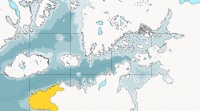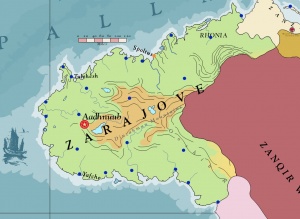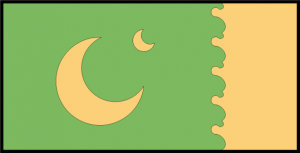Zarajove

Zarajove is a broadly-shaped peninsula delimiting the western end of the Danonan Continent. The name Zarajove derives from the Zarajoveni Tribes who settled the land around 1515 AS, migrating by means of skycraft from southeastern Danona, displacing and absorbing the native Denzahmi people. Today Zarajove is a Sultanate and most Zarajovians are Imzaami. A united Zarajove arose in 1671 when Sultan Tasmagut I united the tribes through war and diplomacy. Zarajove is one of the original signatory countries of the 2515 Accord of the Princes of Law. The word 'Zarajoveni' refers to the ethnic Zarajoveni Tribes that immigrated into the land in the early 16th century, while the term 'Zarajovian' refers to state of Zarajove and its citizens, regardless of their ethnic origin.

Asdarography
Zarajove comprises the western peninsular end of the continent of Danona and stretches of land along the north and south coast. The central region of Zarajove is Denzahmi Plateau which consists of a mountainous highland. Northern Zarajove touches the westernmost end of the Pallathantic Sea, its western coast faces the Mathareusan Sea, and its southwestern coast touches the Askonian Ocean. The Sultanate of Zarajove shares boundaries with the Kingdom of Oliblish, the Zanqir Wastes, and the Zanzary Coast. Zarajove shares a border of sorts with Ukurgiy.
Climate and Flora
Zarajove has a warm, verdant coastal climate with a temperate highland and a dry eastern interior towards the Zanqir Wastes. Monsoon rains visit most of the country in the late summer. In the late winter, clouds from the north dump rains upon the high places of the Denzahmi Plateau in central Zarajove.
Chronology of Zarajove
- 1515 Zarajoveni Tribes settle in the Dinzahmun Mountains of western Danona
- 1671 Tasmagut unites Zarajove under his rule and is acknowledged first Sultan of Zarajove
- 1948 Last Sultan of Tasmagutine Dynasty slain by a rival
- 1948 to 1972 disunified Zarajove ruled by chieftains and chaos priests
- 1972 to 2093 Bisvaçürit Dynasty rules Zarajove
- 2093 Family of Bisvaçürit Dynasty slain by chaos cultists
- 2093 to 2218 various chieftains and chaos priests rule Zarajove
- 2218 Süjamaz the Ecstatic begins his rule of Zarajove
- 2303 to 2307 Tenth Isbajath
- 2307 Zarajove liberated from the rule of Süjamaz the Ecstatic in the Tenth Isbajath
- 2322 Establishment of Açësmani Dynasty, 2322 to present
- 2515 Zarajove is an original signatory to the Accord of the Princes of Law
- 2556 Zarajove conquered by the Gorcorumbese Empire. Sultan capture and executed. Several sons taken into custody to Gorcorumb. Rest of household flees into exile to Oliblish
- 2569 Uprising in Zarajove, Gorcorumbese Satrap slain. Sultan in custody executed.
- 2581 Zarajove liberated from the Gorcorumbese Empire as a consequence of the Fourth Geddamin War
- 2631 Rhonia incorporated into the Sultanate of Zarajove
Sultanate of Zarajove 
Modern-day Zarajove is ruled by a sultan. The Sultanate was restored to Zarajove in the twenty fourth century when Zarajove was liberated from chaos by the Tenth Isbajath which saw the fall of the rule of Süjamaz the Ecstatic. The Sultanate of Zarajove became a dependency of the Gorcorumbese Empire of the Ephysgæes in the late twenty sixth century. The Gorcorumbese took advantage of a dynastic struggle, sent the royal family into exile, and installed a Satrap. Zarajove regained independence during the Fourth Geddamin War, 2581, when the a relation of the royal family living abroad returned from exile and led a rebellion against Gorcorumbese rule. Zarajove's rebellion was synchronous with revolts elsewhere in Danona and the Great Sky War.
Principle Cities
The capital and largest city of Zarajove is Aadhnuub. Other cities include Spoltus, Tulchesh, and Yafche.
Demographics
Most Zarajovians are descended from the Zarajoveni Tribes, while the largest minority are of Denzamhi heritage. The remaining minority are humans from elsewhere in the Pallathantic Region, half orcs, and Jykki orcs. The Denzahmi minority live mainly in the coastal cities.
Languages
Zarajoveni is widely spoken throughout the country and is the official language of the government and commerce. Denzahmi is still spoken in homes and small towns, especially in the Denzahmi Plateau. Jykki orcish is spoken in very small groups, especially along the eastern frontier. Many Zarajovians study Dagaithi which is the original language of the Bahraz, the core book of the Imzaami Religion. Modern Zarajoveni has many borrowings from Denzahmi, Dagaithi, and even from Jykki orcish. It is related to Djimya languages still spoken in central Asdauria.
Religion
The dominant religion of Zarajove is Imzaha. Religious minorities include Incarnandists, Arathracians, and Denzahmi polytheists. The native religion of the Denzahmi people is tolerated, but chaos cults are expressly prohibited in Zarajovian law.
Culture
The culture of Zarajove has developed over more than a thousand years. Zarajoveni Tribes have a long and rich heritage of skycraft for transportation, herding, and warfare. Denzahmi people continue to practice their native polytheism usually in private to avoid persecution or ridicule.
See Also
| This article is a stub. It requires further development by the creator. |
